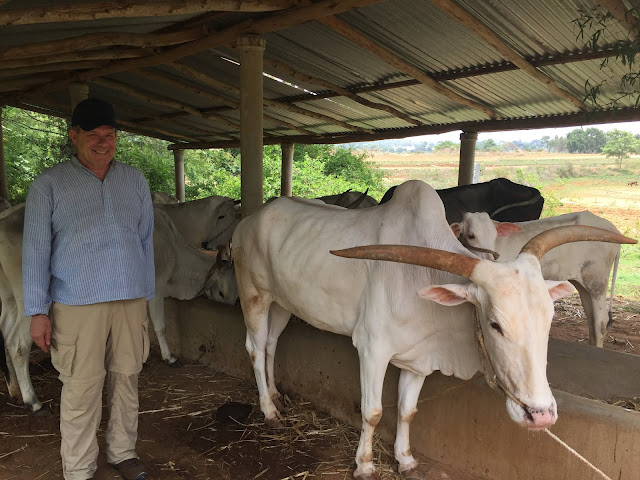The day started with two-hour bus ride (we met at 6:15 a.m.!) to Navadarshanam, a 110-acre organic and sustainable farm. On the way, we stopped for breakfast and South Indian filter coffee, which has quickly become a favorite of mine.
The day started with two-hour bus ride (we met at 6:15 a.m.!) to Navadarshanam, a 110-acre organic and sustainable farm. On the way, we stopped for breakfast and South Indian filter coffee, which has quickly become a favorite of mine.
At Navadarshanam, we were greeted by Mr. Gopi Sankarasubramani, a former aerospace engineer who now lives and works at Navadarshanam. Navadarshanam was founded by people from many different backgrounds, but they had one thing in common—they wanted to lead simpler, sustainable, more fulfilling lives. Thirty years ago, Navadarshanam was completely barren. Now, it is home to lush greenery, a plethora of crops, and lots of wildlife.
All aspects of life on the farm are tailored to reducing the environmental cost and contributing to the community. Two biodigestors located on the campus turn cow dung into natural gas used for cooking. Because Navadarshanam is off the grid, solar power provides enough energy for lighting in the structures. Even the structures are made from sun baked bricks rather than traditional red bricks, which require more energy to make. Water is harvested from the rain and used for drinking and irrigating the crops.
Navadarshanam organized a CSA with the help of local farmers to provide people with locally sourced, sustainable, organic food. Local farmers only farm for 2-3 months of the year, so Navadarshanam teaches the farmers how to make make products using value added processing to make money to sustain themselves year round.
In addition to learning about Navadarshanam, the day included having a nap worked into our schedule, walking into the neighboring village to play hopscotch with the kids, and watching the rain from the porch of our cabin.
The Earth is a finite planet with finite resources. Take a minute to look at your next meal before you eat it to connect with your food and think about where it came from. We can all make little changes to our daily lives to reduce our carbon footprint, even from a small apartment in Minneapolis! Use reusable grocery bags, shop at thrift stores, and grow some herbs. Every bit counts!
-Lucy S.


